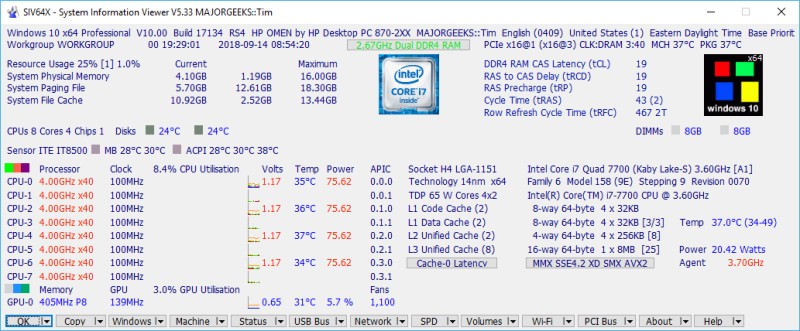SIV (System Information Viewer) has recently released version 5.81, a comprehensive utility designed to provide detailed information regarding Windows operating systems, network configurations, and hardware components. This tool is capable of displaying a wide array of system data, including insights into the CPU, PCI, PCMCIA, USB, SMBus, SPD, ACPI, among other essential hardware components.
SIV is compatible with a range of Windows versions, from the latest Windows 11 down to older systems like Windows NT 3.51. The utility offers additional functionality, such as controlling All-in-One (AIO) devices, which includes managing fans and LED lighting. To access this feature, users can employ the -AIOCTL command line qualifier, which enables SIV to modify the EnhancedPowerManagementEnabled registry setting and subsequently restart the USB device for effective control.
The software uses various text files like pcidevs.txt for PCI device information, usbdevs.txt for USB devices, and mondevs.txt for monitoring PCMCIA device descriptions. This functionality makes it easier for users to identify and manage their hardware effectively.
In addition to its core features, SIV can serve as a valuable tool for troubleshooting hardware issues and optimizing system performance. Users can leverage its capabilities to not only monitor device statistics but also to gain insights into system stability and resource utilization. For those looking to delve deeper into system specifications, SIV can complement other utilities and methods, providing a comprehensive overview of the computer's hardware configuration.
As technology continues to evolve, tools like SIV will likely incorporate more features and support for emerging hardware standards, ensuring that users remain informed about their system's capabilities and performance
SIV is compatible with a range of Windows versions, from the latest Windows 11 down to older systems like Windows NT 3.51. The utility offers additional functionality, such as controlling All-in-One (AIO) devices, which includes managing fans and LED lighting. To access this feature, users can employ the -AIOCTL command line qualifier, which enables SIV to modify the EnhancedPowerManagementEnabled registry setting and subsequently restart the USB device for effective control.
The software uses various text files like pcidevs.txt for PCI device information, usbdevs.txt for USB devices, and mondevs.txt for monitoring PCMCIA device descriptions. This functionality makes it easier for users to identify and manage their hardware effectively.
In addition to its core features, SIV can serve as a valuable tool for troubleshooting hardware issues and optimizing system performance. Users can leverage its capabilities to not only monitor device statistics but also to gain insights into system stability and resource utilization. For those looking to delve deeper into system specifications, SIV can complement other utilities and methods, providing a comprehensive overview of the computer's hardware configuration.
As technology continues to evolve, tools like SIV will likely incorporate more features and support for emerging hardware standards, ensuring that users remain informed about their system's capabilities and performance
SIV (System Information Viewer) 5.81 released
SIV (System Information Viewer) displays useful Windows, network, and hardware info.


